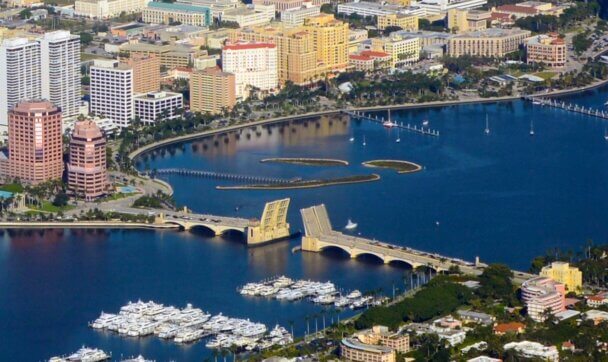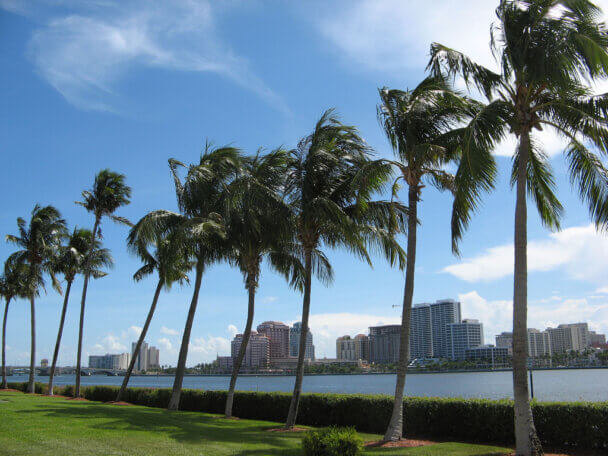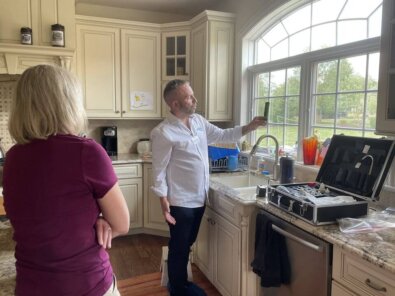Struggling with hard water in West Palm Beach, FL? Angel Water understands the specific water challenges faced by residents here. Our high-quality water softening systems are designed to eliminate excess calcium and magnesium, providing soft, clean water for your home or business. With over 50 years of experience in the water treatment industry, we are dedicated to enhancing your water quality and ensuring your complete satisfaction. So, if you need water filtration equipment and supplies or the services that go with them, please don’t hesitate to stop in or reach out.
Water Softener Companies
in West Palm Beach, FL

Quick Start Guide for Solving West Palm Beach Water Issues
- Reach Out – Call or submit a form to learn more and schedule an appointment.
- Water Testing – We’ll come to your home to test your water to understand your water problems.
- Discuss Our Findings – Learn what’s lurking in your family’s water and have your questions answered.
- Recommend Solutions – Our water expert will recommend equipment to remedy your home’s unique issues.
- Execute Your Clean Water Plan – We’ll install and maintain the water quality equipment needed to address your water issues.

Local Water Problems in West Palm Beach, FL
West Palm Beach is a subtropical paradise that offers residents a wide range of diverse wonders. Get up close and personal with endangered species at McCarthy’s Wildlife Sanctuary or explore all things manatee at Manatee Lagoon. Indulge in some mouthwatering Cuban-inspired food at Calle Dragones before spending a day of fun at Rapids Water Park.
Unfortunately, West Palm Beach is also home to some local water problems…
How Does West Palm Beach Get Its Water?
The City of West Palm Beach gets its water from rainfall stored in a part of the Everglades Ecosystem known as the Grassy Water Preserve. The West Palm Beach water department also sometimes gets its water supply from Lake Okeechobee when needed. What’s interesting about the system is that it replenishes itself, and part of the Everglades are protected, meaning they’re well maintained.
In addition, WPB water filters itself. How so, you ask? Blue and green algae (paraphytes) that often covers Lake Okeechobee are natural filtration systems that produce clear water. If any contaminants are present by the time the water gets to the Grassy Water Preserve, they’re tested and eliminated before going to the water treatment plant. The water treatment plant serves around 112,000 citizens of Palm Beach.
As if contaminated water wasn’t bad enough, you must also be on the lookout for hard water.
West Palm Beach water has a hardness level of 317 parts per million or 19 gpg. The numbers indicate very hard water and can create a host of problems for residents. Issues that might come to fruition include:
- Spots on dishes
- Brittle hair or hair that feels dirty
- Dry skin
- Broken appliances
- Markings on clothing
A water’s hardness level increases when there’s a significant buildup of minerals in the supply. Water softeners get rid of the buildup so that the supply is fresh and clean. So, think about getting a water softener if you live in West Palm Beach!
What’s in the Drinking Water in West Palm Beach?
The Environmental Protection Agency (EPA) has standards that every city’s water supply must abide by. However, these benchmarks haven’t been upgraded in years, and they aren’t nearly strict enough to protect human health.
Therefore, we strongly recommend looking at the Environment Working Group’s (EWG) numbers over the EPAs. The EWG gives you an unbiased opinion of what your water should look like. Unlike the EPA, the EWG is a non-profit independent organization that wants you to have the cleanest water possible.
Here is an overview of the contaminants detected in West Palm Beach water that exceed the EWG’s health guidelines.
| CONTAMINANT | TOTAL |
EWG RECOMMENDED
|
| Chromium (hexavalent) | total .110 ppb |
EWG guideline 0.02ppb
|
| Haloacetic Acids (HAA9) | total 18.3ppb |
EWG guideline 0.06ppb
|
| Total Trihalomethanes (TTHM) | total 37.1ppb |
EWG guideline 0.15ppb
|
Let’s take a closer look at these contaminants and the problems they can cause.
Chromium (Hexavalent)
Hexavalent chromium, also called chromium-6, is a naturally occurring carcinogen that comes from industrial environments. Although West Palm Beach’s numbers are below the national average, they’re still high.
You might experience severe health issues if you’re subjected to too much chromium-6. Several cancers, respiratory diseases, and heart and liver problems have been associated with high levels of exposure.
Haloacetic Acids
Haloacetic acids are nine disinfectants that can form when water is treated with chlorine or chloramine. West Palm Beach’s water department treats its water with chlorine because it’s the most effective solution. Though there are several health issues linked to chlorine, its positives outweigh the negatives.
Total Trihalomethanes (TTHMs)
Like Haloacetic acids, total trihalomethanes pop up during the treatment process. Only one, Bromochloromethane, tested higher than the EWG’s guidelines.
Excessive exposure to TTHMs has been linked to bladder, kidney, and liver cancer.
Other Contaminants Detected
The EWG also found other contaminants in the City of Palm Beach water. These include:
- Aluminum
- Barium
- Chlorate
- Chromium
- Cyanide
- Di(2-ethyhexyl) phthalate
- Fluoride
- Manganese
- Molybdenum
- Nitrate
- Nitrite
- Strontium
- Vanadium
It should be noted that these toxins didn’t exceed EWG’s guidelines, but they’re still present and can lead to health problems. You can learn more at the EWG’s West Palm Beach page.
Water Softener Installation in West Palm Beach, FL
At Angel Water, our licensed plumbers are committed to safeguarding your family’s well-being by following all Florida plumbing regulations. We approach every installation with the highest level of precision because even minor mistakes can allow harmful bacteria, viruses and other contaminants into your drinking water, putting your loved ones at risk. We take every precaution to ensure your safety and believe you should do the same!
Water Softeners in West Palm Beach, FL
Water softeners come in various sizes, brands and models, including advanced options, to suit the unique needs of every West Palm Beach home. Whether your water comes from a city supply or a well, Angel Water offers customized solutions to meet your water-softening needs. We especially recommend the PurASoft ERRC3702 for our West Palm Beach customers, renowned for its outstanding reliability and performance.
Reverse Osmosis Systems in West Palm Beach, FL
Our reverse osmosis systems in West Palm Beach are designed to protect your home’s drinking water from harmful contaminants like cyanide, lead, mercury and hexavalent chromium. Many of our advanced RO systems include carbon filters that improve the taste and smell of your tap water, making it more enjoyable and encouraging you to drink more often.
Chlorine Injection in West Palm Beach, FL
A chlorine injection system effectively addresses common tap water issues, such as unpleasant odors and sour tastes, by eliminating bacteria and oxidizing toxins. Additionally, a chlorinator protects your home’s plumbing and supports your family’s health by ensuring consistently high water quality.
Whole House Filters in West Palm Beach, FL
Whole-house filters in West Palm Beach provide a comprehensive solution by purifying every drop of water in your home. This thorough filtration enhances the quality of your drinking water and resolves common issues such as chlorine odors, metallic tastes and clothing staining or fading.
Sump Pumps and Battery Backups in West Palm Beach, FL
We provide sump pumps and battery backups to protect your West Palm Beach home from flooding and water damage. Without adequate protection, water issues can lead to serious health and structural problems, including respiratory issues, severe allergies, mold growth and foundation cracks. At Angel Water, we are dedicated to safeguarding your family and property with our dependable solutions.
Water Heaters in West Palm Beach, FL
If you’re dealing with cold showers, rising energy bills or low water pressure with no clear cause, your water heater might be the issue. Fortunately, Angel Water offers a selection of electric and gas water heaters from top brands designed to meet the needs of families and homes of all sizes and water usage levels.
Alkaline Water in West Palm Beach, FL
Many West Palm Beach residents believe maintaining the body’s pH balance is crucial for overall health, as an overly acidic blood pH can lead to various health issues. To support this, Angel Water offers an Alkaline/Remineralizing System that can be easily added to your existing reverse osmosis system.
Water Softener Maintenance in West Palm Beach, FL
Regular water softener maintenance ensures consistent protection for your home and family. During these service visits, we address common issues like leaks, salt usage and low water pressure. By staying proactive with maintenance, you keep your water softener running efficiently, extend its lifespan and maximize your return on investment.
Water Testing in West Palm Beach, FL
Are you aware of the contaminants that could be in your home’s water? The only way to know for sure is through testing water directly from your faucet. City water reports are typically conducted at the street level and may not reflect contamination in the pipes between the street and your faucet. If you use well water, testing is even more crucial, as there are no regulatory agencies monitoring its quality. Ultimately, ensuring the safety of your water is your responsibility.
Plumbing Services in West Palm Beach, FL
In Florida, water filtration equipment must be installed by licensed plumbers, and Angel Water strictly follows this regulation. We prioritize your family’s health and are fully aware of the risks associated with improper plumbing practices.
Why Choose Angel Water?
Expertise:
Over 50 years of experience in resolving water quality issues.
Advanced Technology:
Our water softeners use the latest technology for efficient operation.
Customer Satisfaction:
Free water analysis and customized solutions tailored to your needs.
Qualified Professionals:
Our services are performed by qualified plumbers in Florida, ensuring top-notch expertise and compliance with local regulations.
Highly Rated:
Over 1,000 5-star ratings on Google demonstrate our commitment to excellent service.
Lifetime Warranty:
The only company offering a lifetime warranty on our ERR-3700 series filters.
A+ BBB Rating:
An A+ rating with the Better Business Bureau shows our commitment to quality service.
Learn More About Water Quality in West Palm Beach, FL
Angel Water is dedicated to keeping our customers informed about the latest news and information surrounding local water quality, the equipment that treats it and related topics. If you want to learn more about water, check out our extensive resource library. You’ll find videos, blogs, FAQs and much more on these topics.
Water Softener Companies in West Palm Beach, FL
Are you looking for top-notch water filtration equipment, water heaters or sump pumps and battery backups? Want to pair the best equipment with unrivaled customer service? Call Angel Water today at (561) 899-6585 or complete the contact form below to get started! We look forward to hearing from you!
Get Started With a FREE Water Test
Just fill out the form below and we will reach out to
schedule the best time for your free water test!

